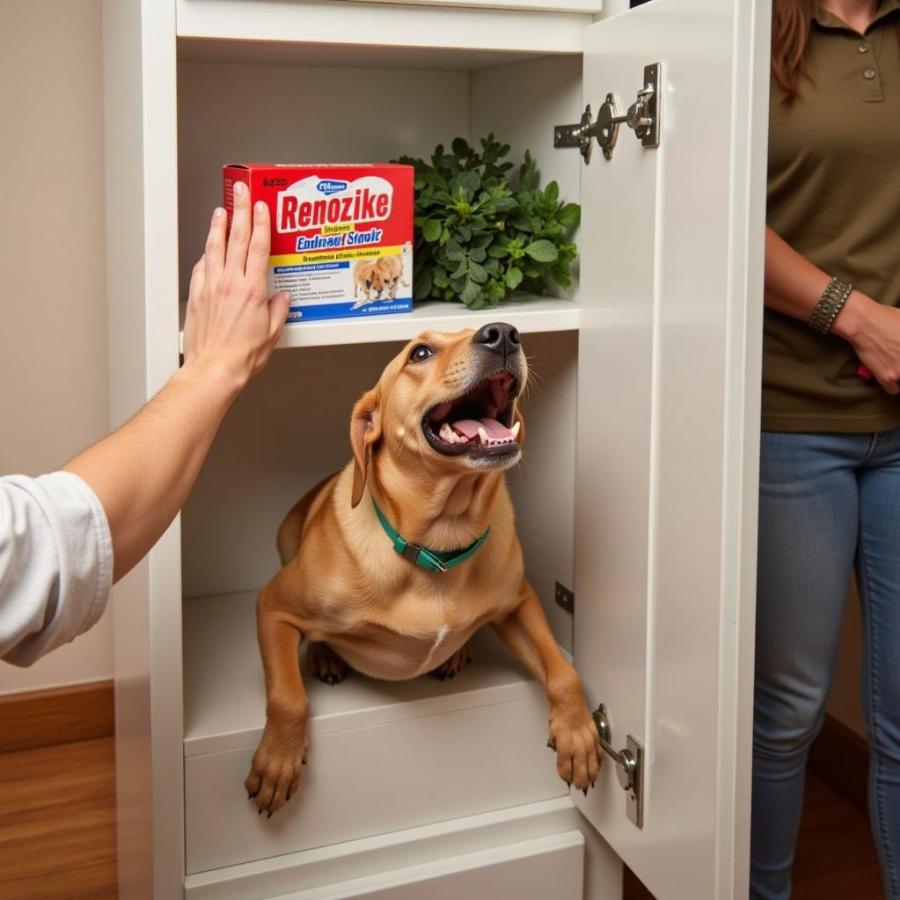Dog bromethalin poisoning is a serious concern for pet owners. It’s a highly toxic substance found in certain rodenticides (rat and mouse poisons) that can have devastating effects on dogs, even in small amounts. Understanding the dangers of bromethalin poisoning, recognizing the signs, and knowing how to respond quickly can mean the difference between life and death for your furry friend.
What is Bromethalin and Why is it Dangerous for Dogs?
Bromethalin is a neurotoxin, meaning it attacks the nervous system. Unlike other types of rat poison that require multiple feedings to be effective, bromethalin can be lethal after a single, small dose. It works by disrupting the energy production within cells, leading to a buildup of fluid in the brain and spinal cord. This can cause a range of severe neurological symptoms that can quickly become life-threatening.
Recognizing the Signs of Bromethalin Toxicity in Dogs
The signs of bromethalin poisoning in dogs can vary depending on the amount ingested and the time elapsed since exposure. It’s crucial to be vigilant and seek immediate veterinary care if you suspect your dog has ingested any amount of rodenticide, even if they don’t show immediate symptoms.
Here are some common signs of bromethalin poisoning:
-
Early Signs (may appear within a few hours to days):
- Loss of appetite
- Lethargy
- Weakness
- Uncoordinated movements (ataxia)
- Vomiting
- Diarrhea
-
Severe Signs (may develop within 12-36 hours):
- Tremors
- Seizures
- Paralysis
- Difficulty breathing
- Coma
What to Do if You Suspect Bromethalin Poisoning
Act fast! Time is of the essence when it comes to bromethalin poisoning.
- Remove your dog from the area where the suspected poisoning occurred to prevent further ingestion.
- Check for any remaining poison and collect a sample if possible, taking care to avoid direct contact.
- Call your veterinarian or the ASPCA Animal Poison Control Center (APCC) immediately at (888) 426-4435. They can provide guidance based on your dog’s size, the amount ingested, and the time elapsed.
- Follow their instructions precisely. They may advise you to induce vomiting at home if the ingestion was recent, but never induce vomiting unless directed by a veterinarian.
- Get to the veterinarian as quickly and safely as possible.
Diagnosis and Treatment of Bromethalin Poisoning
If you suspect bromethalin poisoning, your veterinarian will conduct a thorough physical examination and may recommend tests such as:
- Blood tests to assess organ function.
- Urinalysis to check for abnormalities.
- Imaging tests (X-rays, ultrasound) to rule out other conditions.
Unfortunately, there is no specific antidote for bromethalin poisoning. Treatment typically focuses on supportive care, which may include:
- Inducing vomiting if the ingestion was recent.
- Administering activated charcoal to bind to the toxin in the stomach and prevent further absorption.
- Intravenous fluids to maintain hydration and electrolyte balance.
- Medications to control seizures, reduce brain swelling, and manage other symptoms.
- Nutritional support through a feeding tube if necessary.
Prognosis and Long-Term Effects
The prognosis for dogs with bromethalin poisoning is guarded and depends on several factors, including the amount ingested, the time elapsed before treatment, and the severity of symptoms. Early and aggressive treatment offers the best chance of survival.
Sadly, even with prompt veterinary care, bromethalin poisoning can be fatal, especially in severe cases. Dogs that survive may experience long-term neurological damage, such as:
- Seizures
- Blindness
- Paralysis
- Behavioral changes
Preventing Bromethalin Poisoning: Keeping Your Dog Safe
Prevention is key to protecting your dog from the devastating effects of bromethalin poisoning. Here are some essential preventative measures:
- Store all rodenticides out of reach of pets, preferably in locked cabinets or high shelves.
- Consider using alternative pest control methods that are safe for pets, such as traps or natural repellents.
- When walking your dog, be mindful of potential poison hazards and keep them on a leash to prevent them from scavenging or ingesting unknown substances.
- Educate yourself and your family about the dangers of rodenticides and the importance of pet-safe pest control.
 Dog Owner Storing Rodenticides Safely
Dog Owner Storing Rodenticides Safely
“An ounce of prevention is worth a pound of cure.”
Remember, bromethalin is a dangerous substance that poses a serious threat to dogs. By being aware of the risks, recognizing the signs of poisoning, and taking proactive steps to prevent exposure, you can help keep your furry friend safe and sound.
Frequently Asked Questions
Q: Can bromethalin poisoning be treated at home?
A: No, bromethalin poisoning is a serious medical emergency that requires immediate veterinary care.
Q: How long does it take for bromethalin to affect a dog?
A: Symptoms can appear within a few hours to days, depending on the amount ingested.
Q: What should I do if my dog eats rat poison that doesn’t contain bromethalin?
A: While not as acutely toxic as bromethalin, other rodenticides can still be harmful. Contact your veterinarian or the ASPCA Animal Poison Control Center immediately for guidance.
Need More Information?
- Contact your veterinarian for personalized advice and care for your dog.
- Visit the ASPCA Animal Poison Control Center website (https://www.aspca.org/pet-care/animal-poison-control) for valuable resources and information on various poisons.
About Beaut Dogs
Beaut Dogs is your go-to resource for all things related to dog care, providing trustworthy and insightful information to help you be the best pet parent you can be. From breed-specific guides to expert advice on health, nutrition, and training, Beaut Dogs empowers you to make informed decisions for your furry companion’s well-being. For any questions or concerns, our team of experts is here to help. Contact us at [email protected] for personalized assistance.